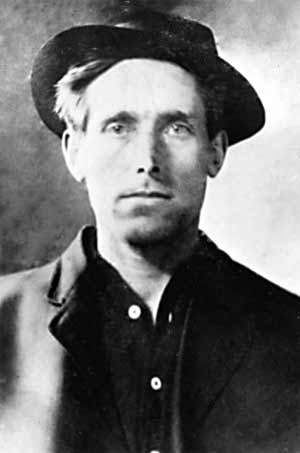“All the world is made of music. We are all strings on a lyre. We resonate. We sing together.”
Source: Heart-Shaped Box
Joe Hill , born Joel Emmanuel Hägglund and also known as Joseph Hillström, was a Swedish-American labor activist, songwriter, and member of the Industrial Workers of the World . A native Swedish speaker, he learned English during the early 1900s, while working various jobs from New York to San Francisco. Hill, an immigrant worker frequently facing unemployment and underemployment, became a popular songwriter and cartoonist for the union. His most famous songs include "The Preacher and the Slave" , "The Tramp", "There Is Power in a Union", "The Rebel Girl", and "Casey Jones—the Union Scab", which express the harsh and combative life of itinerant workers, and call for workers to organize their efforts to improve working conditions.In 1914, John G. Morrison, a Salt Lake City area grocer and former policeman, and his son were shot and killed by two men. The same evening, Hill arrived at a doctor's office with a gunshot wound, and briefly mentioned a fight over a woman. He refused to explain further, even after he was accused of the grocery store murders on the basis of his injury. Hill was convicted of the murders in a controversial trial. Following an unsuccessful appeal, political debates, and international calls for clemency from high-profile figures and workers' organizations, Hill was executed in November 1915. After his death, he was memorialized by several folk songs. His life and death have inspired books and poetry.
The identity of the woman and the rival who supposedly caused Hill's injury, though frequently speculated upon, remained mostly conjecture for nearly a century. William M. Adler's 2011 biography of Hill presents information about a possible alibi, which was never introduced at the trial. According to Adler, Hill and his friend and countryman, Otto Appelquist, were rivals for the attention of 20-year-old Hilda Erickson, a member of the family with whom the two men were lodging. In a recently discovered letter, Erickson confirmed her relationship with the two men and the rivalry between them. The letter indicates that when she first discovered Hill was injured, he explained to her that Appelquist had shot him, apparently out of jealousy.
Wikipedia

“All the world is made of music. We are all strings on a lyre. We resonate. We sing together.”
Source: Heart-Shaped Box
Source: Locke & Key, Vol. 3: Crown of Shadows
“I didn't know the inner me was hungry," I said to Art.
"That's because it already starved to death.”
Source: 20th Century Ghosts
“I'm not questioning your bravery. I'm questioning your intelligence.”
Locke & Key, Vol. 3: Crown of Shadows
Remarks to the judge after being found guilty of murder (1915-07-08), as quoted in Philip Foner, The Case of Joe Hill (International Publishers Co., 1966, ISBN 0-717-80022-9, 127 pages), p. 49. Under Utah law, he was allowed a choice of being shot or hanged.
“Goodbye Bill. I die like a true blue rebel. Don't waste any time in mourning. Organize.”
Telegram to William "Big Bill" Haywood (1915-11-18), quoted in International Socialist Review, vol. XVI (December 1915)
"The Preacher and the Slave" http://en.wikisource.org/wiki/The_Preacher_and_the_Slave (1911)
“I die with a clear conscience, I die fighting, not like a coward.”
Said while being taken to his execution, as quoted in Philip Foner, The Case of Joe Hill (International Publishers Co., 1966), p. 108
My Last Will http://en.wikisource.org/wiki/My_Last_Will (1915-11-18)
"The Preacher and the Slave" (1911)
"There is power in a Union" http://en.wikisource.org/wiki/There_Is_Power_in_a_Union (1913)
Letter to the editor of Solidarity (1914-11-29)
"Workers of the World Awaken"